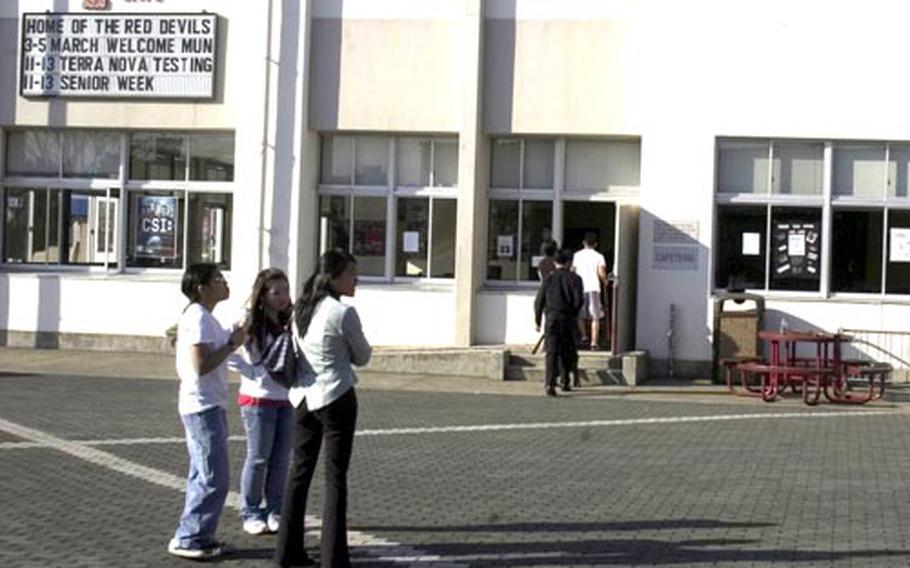
Children hang out after class in the courtyard of Kinnick High School on Yokosuka Naval Base. Warning signs went up on barracks doors at Yokosuka a few months ago to remind residents that -- even on a military base -- a high school student’s place is not in a servicemember’s room. (Christopher B. Stoltz/Stars and Stripes)
YOKOSUKA NAVAL BASE, Japan — Barracks residents beware: high school students cannot tarry there.
Warning signs went up on barracks doors at Yokosuka a few months ago to remind residents that — even on a military base — a high school student’s place is not in a servicemember’s room.
Scant years may separate teens from the 18- to 24-year-old servicemember. But those turn to light years when it comes to sex, teens under 16 and the Uniform Code of Military Justice.
The recent firestorm on Okinawa when a U.S. Marine was accused of sexually assaulting a 14-year-old girl — the case was later dropped by Japanese prosecutors — renewed the focus on the behavior of U.S. troops in regard to sexual assault.
Even when there is no force, the agreement to have sex doesn’t matter if it’s agreed upon by a child under 16 years old, the age of consent set by the UCMJ, said Lt. Cmdr. James Mills, the military justice department head at Yokosuka’s Region Legal Service Office.
The office, which handles cases from naval bases across the region, has prosecuted five cases involving sexual assaults of minors in the last few years, with charges ranging from carnal knowledge — the military equivalent to statutory rape — to indecent acts with a child.
None involved force. All resulted in convictions, Mills said.
“The message needs to be they can consent, and we will still convict you,” Mills said. “All we have to prove is that the couple had sex, they’re not married, and the child is underage. The burden of proof is very low.”
Consider a 2007 case from Misawa Air Base in which a 20-year-old airman met a 15-year-old while he volunteered to help with the high school girls basketball team. The teenager was later found in the airman’s dormitory room during an inspection. A no-contact order was given, but the couple continued to see each other, resulting in a parental call to security after the teenager snuck out of her room.
After the airman received a bad-conduct discharge, nine months’ confinement and reduction in rank to E-1, lead prosecutor Capt. Michael Brusca told Stars and Stripes that “love conquers all, except the UCMJ.”
A 2007 Yokosuka case involved a 14-year-old who met a USS Shiloh sailor on Myspace.com, a social networking site. They were caught in base housing by the child’s active-duty parent. The sailor was sentenced to a year of confinement, reduction in rank to E-1 and total forfeiture of pay and allowances.
Since everyone carries an identification card on a military base, Mills urged military personnel to check identification if they suspect a teen is underage.
“They (the servicemembers) have the power to stop this from happening. They’re the adults. They’re the ones who have the maturity to say, ‘No, this isn’t right,’” Mills said.
On or off: Doesn’t matter
But courts-martial aren’t restricted to base romances. They can focus on trysts that happen while the servicemember is off base or on leave in the States.
Consider this scenario from an Article 32 hearing last month in Yokosuka. A 19-year old Naval Air Facility Atsugi airman went on leave and had sex with a 15-year-old from his Pennsylvania high school. A child was conceived. The teen called the Navy for child support, and as a result, charges were brought against the airman in accordance with the UCMJ. Pennsylvania law rejects statutory rape when partners are less than four years apart in age — but military members fall under the UCMJ all the time, no matter where they are.
Dire consequences
The aftermath can be “life altering” for all parties involved, Mills said. For the servicemember, beyond jail time and likely losing his or her military career, conviction means a new identity as a sex offender and the registration requirements that go with it.
“The label follows you for quite a long time,” Mills said. “It’s hard to go back home. I’ve known of some people who were too ashamed to go back to their own communities. They say ‘I’m not a pedophile or a molester,’ but they’re grouped with the same people who are molesting children and distributing child pornography.”
For teens, it can mean not finishing high school or can result in trauma associated with sexual exploitation.
Working in high schools, Yokosuka’s Nile C. Kinnick High School Principal David Tran has seen students drop out of school or get pregnant, he said.
These students face an “uphill battle,” Tran said. “They’re impressionable and want people to like them at any cost. When kids are 14 and 15 years old, they may look physically ready, but they are mentally nowhere near it. They may be close in age to a military member, but status-wise, they’re a world apart.”
Stripes reporter Jennifer Svan contributed to this report.
UCMJ clear on rules about age of consent
The UCMJ is clear: Servicemembers cannot have sex with teenagers before the age of consent — 16. If the child is 12 or under, there’s no excuse. If the child is over 12 years old, the UCMJ allows for the defense “I thought the person was over the age of consent” only if it is “honest” and “reasonable” according to the community standard.
At a military base, everyone has an identification card and juries have found that it’s reasonable to check in some recent cases, said Lt. Cmdr. James Mills.
Here are some of the common misconceptions servicemembers and teens under 16 have about sex with each other.